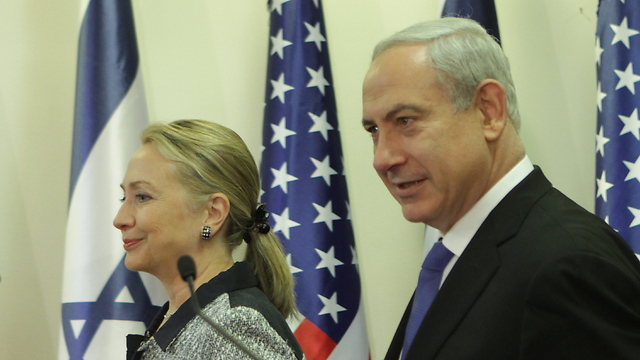
Clinton e-mails reveal thoughts on Israel
New batch of communications sent on Hillary Clinton's private server give a behind-the-scenes look at the then-secretary of state's views on Israel, and particularly Prime Minister Netanyahu.
Among the 562 e-mails sent by Hillary Clinton publicly released this weekend were several regarding the former secretary of state's thoughts about Israel, and particularly Prime Minister Benjamin Netanyahu.
One e-mail contains a redacted transcript of a conversation between the then-US secretary of and Prime Minister Netanyahu, sent by a Clinton assistant with the concise, yet evocative subject line: "Very rough". The contents of the conversation are completely redacted after the two politicians greet each other.
In another e-mail, Clinton discusses an interview given by outgoing Israeli National Security Adviser Uzi Arad to Nahum Barnea and Shimon Shiffer in Yedioth Ahronoth, particularly reports in Israel that Arad had been forced to resign after the Shin Bet began suspecting he was responsible for leaking information.
Clinton wrote: "You should get whole, translated article. US press should report asap." Among the articles in the e-mail was a May 2011 article from Ynetnews. Clinton's aide claimed that Netanyahu had tried to dismiss the claims "with a story published by the Jerusalem Post, right-wing Likud organ." In the same e-mail, the aide wrote to Clinton: "Holy Moly! What more can you find out about this and why Arad had to resign?"
An e-mail sent on January 17, 2011, by Martin Indyk, former US ambassador in Israel, to senior Clinton aides regarded Ehud Barak's split from Labor and the possible ramifications for the peace process. Initial assessment of Barak's preemptive strike on the Labor Party is that it stabilizes Bibi's coalition and eliminates any remaining moderating influence of Barak," it read. "The coalition math leaves Bibi with 5 more votes for his coalition than if Labor had forced Barak to leave the government. On the other hand, Barak and his 4 followers will not dare leave the government now for fear of being consigned to oblivion. Of course Lieberman or Shas can bring the government down at any time so Bibi remains dependent on them.
"This is exacerbated by Tzipi's withdrawing of any potential safety net for Bibi," continued Indyk. "She is now intent on bringing the government down and has convinced Mohfaz to stick with her (especially because with Barak velcroed to Bibi, there's no place for Mohfaz in the government). So, bottom line, the already dismal prospects for a peace breakthrough just grew dimmer. This is not Bibi's spin. His line is that this will prove to Abu Mazen that the Israeli government will run its course and therefore he is better off negotiating with it than waiting another 2 years."
Another released e-mail is one then-opposition chief Tzipi Livni sent to Clinton in 2011, including suggestions of what the US should do in order to prevent terror groups from taking advantage of democratic elections, as occurred in Gaza and in the case of the Muslim Brotherhood in Egypt.
Livni asks Clinton in the e-mail that the US set rules and a democratic code for Arab countries revolting against dictatorships in order to prevent a hostile takeover and exploitation of the vote.
The e-mail was forwarded to Clinton by US Ambassador to Israel Dan Shapiro, who received it from Livni. "You may recall in our initial conversation about this, I raised with you my firm conviction that truly democratic elections required a commitment by the parties running for office to some core democratic values," Livni wrote.
"I discussed my frustration that in the case of Hamas in Gaza and Hezbollah in Lebanon, the international community had limited its definition of democracy to the technical conduct of voting and failed to insist that those who sought the benefits of the democratic process accept its underlying principles as well. The result, as you know, was to give a measure of democratic legitimacy and power to forces that were plainly not committed to democratic principles and that continue to pose a danger to their own societies and to their neighbors"
Close Clinton adviser Sid Blumenthal sent an October 4, 2012 e-mail informing her of what his son Paul had written in the Huffington Post about Ehud Barak: "According to Paul, another reporter at Huff Post told him that he was informed by a staffer on the NSC that Barak was at the White House recently having a secret meeting with the President.
"At the same time, Michael Oren had finished some meeting at the NSC and somehow heard that Barak was in the building," Indyk wrote. "Oren raced around the West Wing searching for Barak, opening doors and looking in rooms. Donilon heard about Oren's frantic snooping and raced after him, catching him, and escorted him out. Apocryphal? True? If false, it still reflects the split between Bibi and Barak."
Hillary Clinton responded: "Doubt that it happened, but, these days, who knows???"
MK Oren, in response to the account described in the email Sunday morning, said that "the report, from Hillary Clinton’s email, that claims I was at the White House when Ehud Barak held secret talks with President Obama and looked for him frantically, going from room to room, until I was accompanied out of the building, has no basis in reality. Every visit by the Israeli minister of defense is coordinated with the embassy in Washington and there is no situation where an ambassador would be able to walk around the White House freely. The report is totally fictitious.”













